Las Vegas, Oct. 13 – Tonight the Democratic candidates for president will debate each other for the first time this season. While many minority groups are sure to be discussed, America’s largest minority group, people with disabilies (PwDs) is an important group to pay attention to.
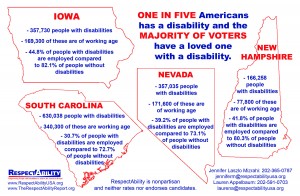
America has 56 million people with disabilities, more than 20 million of whom are working age. Polls show that the majority of voters either have a disability or a loved one with a disability. Voters with disabilities and their families are up for grabs — and the actions that campaigns take to reach out to these voters can make the difference between winning and losing. Indeed, 357,035 people in Nevada, the location of the debate, have disabilities. Of that number, 171,600 are working age. Only 39.2 percent are employed compared with 73.1 percent of people without disabilities in Nevada. Among Nevadans with disabilities, 8,200 are between the ages of 16 and 20. Each year at least 2,050 young people with disabilities are aging out of the school system.
So what should the presidential campaigns do? RespectAbility put together an easy guide for campaigns to ensure they reach this important demographic.
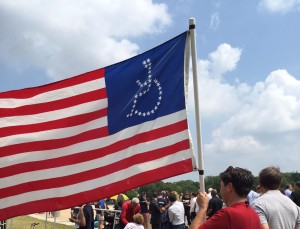 Have your candidate put out a statement/quote NOW that says that they want people with disabilities, just like all other Americans, to be able to achieve the American dream. When you put out a statement, share it with LaurenA@RespectAbilityUSA.org so we can ensure that the full disability community sees/hears it.Here are some things polls show voters want to hear:
Have your candidate put out a statement/quote NOW that says that they want people with disabilities, just like all other Americans, to be able to achieve the American dream. When you put out a statement, share it with LaurenA@RespectAbilityUSA.org so we can ensure that the full disability community sees/hears it.Here are some things polls show voters want to hear:
- Our nation was founded on the principle that anyone who works hard should be able to get ahead in life. People with disabilities deserve to be able to work to achieve the American dream, just like anyone else.
- Companies like Walgreens, E.Y., Starbucks and others have shown that employees with disabilities are loyal, successful and help them make more money. If we find the right jobs for the right people, it can and does increase the bottom line of companies.
- People with disabilities bring unique characteristics and talents to workplaces that benefit employers and organizations. Stephen Hawking is a genius who happens to use a wheelchair. People with disabilities can work in restaurants, tend our parks, and be super talents in developing computer software.
- All your events should be ADA accessible. Here are three checklists to help you on that front:
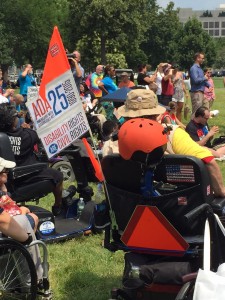 Make sure that people KNOW that your events are accessible so they will come! Planning on having access and space for wheelchairs, closed-captioning and sign-language interpreters? Share this information in your event announcement! In your event RSVP form, ask participants if they need an accommodation; be sure to put a note at the bottom that you’ll fulfill requests as long as you receive them at least 48 hours prior to the event if it is a small event. All large events should automatically have captions and sign language.
Make sure that people KNOW that your events are accessible so they will come! Planning on having access and space for wheelchairs, closed-captioning and sign-language interpreters? Share this information in your event announcement! In your event RSVP form, ask participants if they need an accommodation; be sure to put a note at the bottom that you’ll fulfill requests as long as you receive them at least 48 hours prior to the event if it is a small event. All large events should automatically have captions and sign language.
-
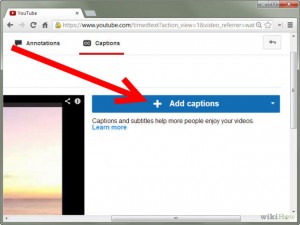
Add Closed Captions to YouTube Videos Make your social media and website accessible to people with hearing and vision differences. It’s vital to ensure your websites are accessible for all: add captions to videos and ensure screen reader accessibility. Make sure your Facebook and Twitter feeds also are accessible. Have a question on how to do so? Email laurena@respectabilityusa.org for help.
-
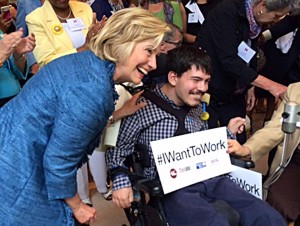
Hillary Clinton with a supporter with sign saying #IWantToWork “Nothing about us without us” is more than a slogan in the disability community. Ensure that you have people with disabilities as staff members, volunteers and activists. We also encourage you to include information on disability rights/issues on your website, as well as to include people with disabilities in your campaign videos and photo-ops.
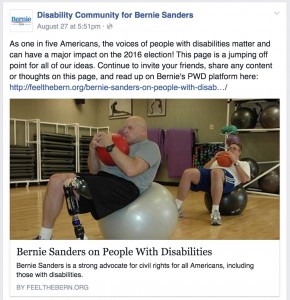 Talk about how your candidate will create opportunities for people with disabilities (PwDs). When a candidate is asked about disability issues and the only thing they offer is that they want to keep benefits checks coming, it insults our desire to work and fully participate in our communities. Yes, a safety net is very important. But studies show that most people with disabilities want to work. Check out this poll from more than 3800 people in the disability community: http://respectabilityusa.com/america-at-risk-2 and this large-scale study: https://kesslerfoundation.org/kfsurvey15. Has your candidate hired people with disabilities or done something to enable people with disabilities to have a better future? Talk about it!
Talk about how your candidate will create opportunities for people with disabilities (PwDs). When a candidate is asked about disability issues and the only thing they offer is that they want to keep benefits checks coming, it insults our desire to work and fully participate in our communities. Yes, a safety net is very important. But studies show that most people with disabilities want to work. Check out this poll from more than 3800 people in the disability community: http://respectabilityusa.com/america-at-risk-2 and this large-scale study: https://kesslerfoundation.org/kfsurvey15. Has your candidate hired people with disabilities or done something to enable people with disabilities to have a better future? Talk about it!
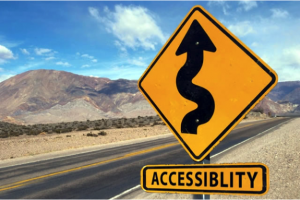 Participate in the national disability community’s Presidential Candidate Town Halls on People with Disabilities, Jobs, and the American Dream. RespectAbility USA and The RespectAbility Report, along with a growing list of nonprofit disability partner organizations, will provide your candidate an opportunity to reach out to the entire disability community. These town halls will be national, nonpartisan events that will provide candidates with the opportunity to articulate their policy positions on the critical issues affecting Americans with disabilities and to describe their vision for ensuring that more people with disabilities can pursue the American Dream, just like anyone else. We would appreciate you putting us in contact with the appropriate person to set up a time for your candidate to join us in participating in a town hall. We’re glad to provide additional information.
Participate in the national disability community’s Presidential Candidate Town Halls on People with Disabilities, Jobs, and the American Dream. RespectAbility USA and The RespectAbility Report, along with a growing list of nonprofit disability partner organizations, will provide your candidate an opportunity to reach out to the entire disability community. These town halls will be national, nonpartisan events that will provide candidates with the opportunity to articulate their policy positions on the critical issues affecting Americans with disabilities and to describe their vision for ensuring that more people with disabilities can pursue the American Dream, just like anyone else. We would appreciate you putting us in contact with the appropriate person to set up a time for your candidate to join us in participating in a town hall. We’re glad to provide additional information.
- Enable your candidate to visit places where people with disabilities are finding work and independence. There are several such places in Nevada. Contact us for help in this.
- Use “people first” language, which emphasizes individuals’ strengths instead of their disabilities. For example, instead of describing someone as “wheelchair bound,” describe him as a “person who uses a wheelchair.” Instead of saying “the handicapped” or “the disabled,” say “people with disabilities.” Don’t use words like “stupid” or “retarded” to mean incompetent. People with intellectual disabilities can be extremely competent in their jobs. Good word choice implies that an individual’s disability is not his primary characteristic. There are many resources on appropriate communication that can be helpful to your staff.
- Beware when talking about gun violence not to throw all people with mental health differences under the bus. The majority of violent crime is perpetrated by people without mental health challenges. Indeed, people with disabilities are MORE likely to become victims of crime than others. Improvement in mental health policies and services is urgently needed. But don’t make matters harder for people with mental health differences by suggesting that everyone with such a difference is at risk for becoming a school shooter.
- Take the time to learn the issues. RespectAbility, in conjunction with Best Buddies, National Association of Councils on Developmental Disabilities (NACDD), National Council on Independent Living (NCIL), Paralyzed Veterans of America (PVA), and National Organization on Disability (NOD) have created our “Disability Employment First Planning Tool.” But there are other issues as well. Do site visits to groups doing best practices for PwDs and have your own disability advisory group.

Be First to Comment